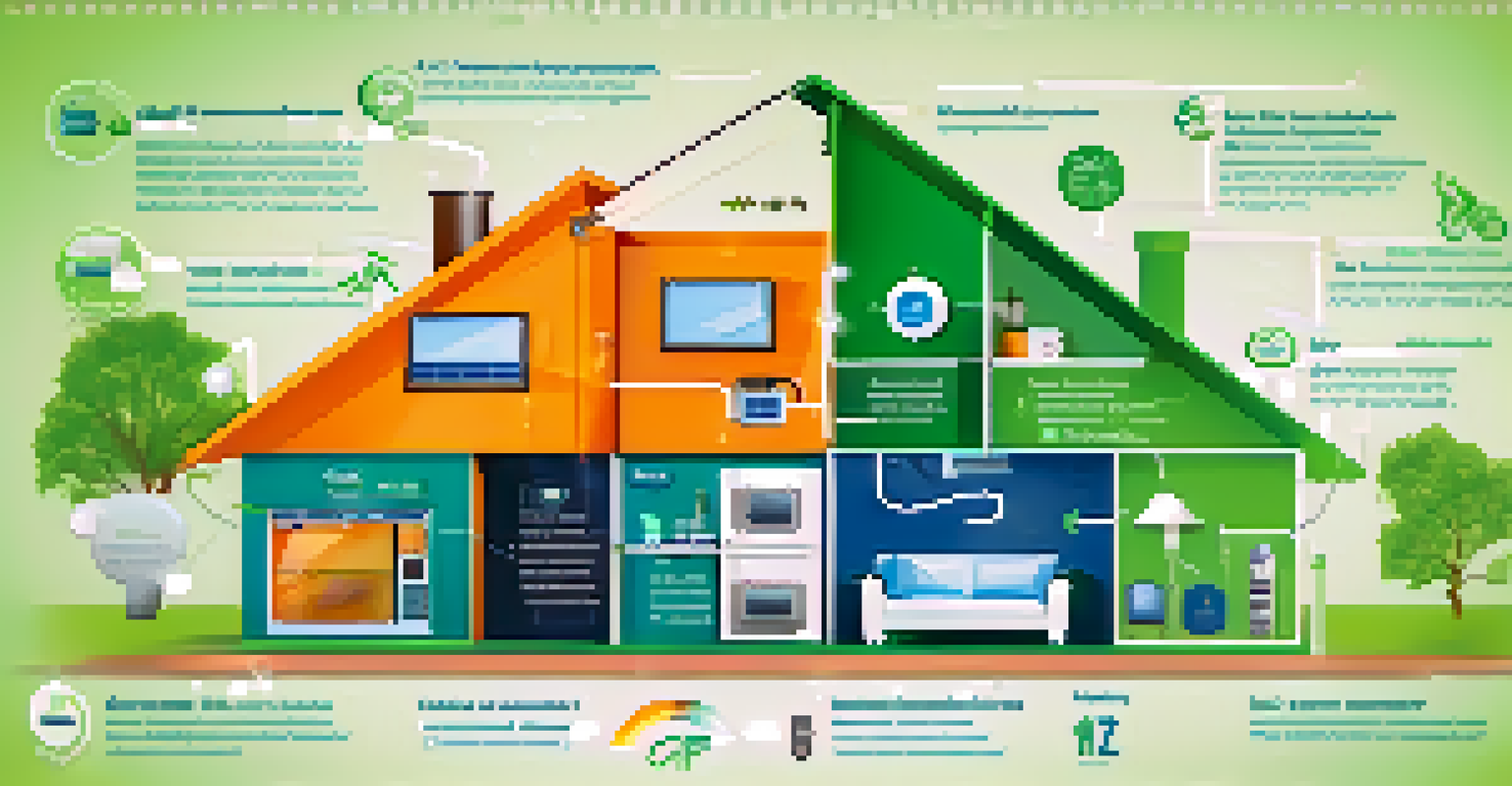The Role of AI in Home Automation: What to Expect

Understanding Home Automation and AI Technology
Home automation refers to the use of technology to control household systems like lighting, heating, and security seamlessly. AI, or artificial intelligence, plays a crucial role in enhancing these systems, making them smarter and more intuitive. By learning from user habits and preferences, AI can automate tasks that once required manual input, making daily life easier and more efficient.
The great thing about voice technology is that it allows you to interact with your home in the most natural way possible.
Imagine walking into a room and having the lights adjust to your preferred brightness automatically. That’s AI at work, processing information and responding to your actions in real-time. This not only adds convenience but also contributes to energy efficiency, as systems can optimize usage based on patterns.
As we look towards the future, the integration of AI in home automation promises even greater developments. We can expect smarter systems that anticipate our needs, making our homes not just automated, but truly intelligent.
AI-Powered Voice Assistants: Your Home's New Best Friend
Voice assistants like Amazon's Alexa and Google Assistant are prime examples of AI in action within home automation. They allow users to control smart devices simply by speaking, making technology more accessible and user-friendly. This hands-free approach is particularly beneficial in busy households where juggling tasks is the norm.

Beyond simple commands, these assistants are getting better at understanding context and natural language. For instance, you can ask your assistant to 'play some relaxing music while dimming the lights,' and it will execute multiple commands at once. This seamless interaction enhances the user experience, creating a more cohesive smart home environment.
AI Enhances Home Automation
Artificial intelligence makes home automation smarter by learning user habits and optimizing household systems for efficiency.
As voice technology evolves, we can expect even deeper integration with home systems. Future advancements might include personalized responses based on individual family member preferences, making interactions more intuitive and tailored.
Smart Security: AI Enhancing Home Safety
Security is a top concern for homeowners, and AI is revolutionizing how we protect our spaces. Smart security systems can now analyze video feeds in real-time, identifying strangers and alerting homeowners to potential threats. This capability significantly reduces the risk of break-ins and enhances peace of mind.
AI is the new electricity. Just as electricity transformed industry after industry, AI is poised to do the same.
Imagine a doorbell camera that not only records but also recognizes familiar faces. If a stranger approaches, the system can send an instant alert to your smartphone. This proactive approach to security means you can monitor your home from anywhere, making it feel like a fortress.
Looking forward, we can anticipate even more sophisticated AI security measures, such as predictive analytics that assess neighborhood crime patterns. This kind of insight will empower homeowners to take preventive action, further enhancing their security.
Energy Efficiency: AI's Role in Sustainable Living
One of the most significant benefits of AI in home automation is its impact on energy efficiency. Smart thermostats, for instance, learn your schedule and adjust heating and cooling accordingly, ensuring that energy isn't wasted when you're not home. This not only lowers utility bills but also reduces your carbon footprint.
Picture a system that adjusts your energy consumption based on real-time pricing from your utility provider. With AI, this is becoming a reality, allowing homeowners to save money while contributing to a more sustainable future. It’s like having a personal energy manager at your fingertips.
Voice Assistants Simplify Living
AI-powered voice assistants allow for hands-free control of smart devices, making technology more accessible and user-friendly.
As we move forward, expect AI to drive even more innovations in energy management. From smarter appliances to integrated home energy systems, the potential for energy savings is vast, making sustainable living easier and more attainable.
Personalization: Tailoring Your Smart Home Experience
AI enables a level of personalization in home automation that was previously unimaginable. By analyzing user behavior, AI systems can adjust settings and preferences to create a unique living experience for each household member. This means your home can adapt to your lifestyle rather than the other way around.
For example, if you consistently lower the thermostat at night, your smart system can learn this habit and make the adjustment automatically. This kind of personalization not only adds convenience but also enhances comfort, making your home feel more welcoming.
As technology progresses, we can expect even more nuanced personalization features. Future AI systems might consider factors like mood, time of day, or even weather conditions, creating a truly responsive home environment.
Interconnectivity: The Foundation of Smart Homes
The backbone of effective home automation lies in interconnectivity. AI technologies allow various smart devices to communicate with each other, creating a cohesive system that works as a unit. This interconnectedness means that your smart lights, thermostat, and security cameras can all share information and respond to changes in real time.
Imagine a scenario where your security system detects motion and automatically turns on the outside lights while alerting you via your smartphone. This level of integration not only enhances convenience but also boosts security and efficiency.
Smart Security Boosts Safety
AI is transforming home security by providing real-time analysis and alerts, significantly enhancing protection against threats.
As we look ahead, the trend towards greater interconnectivity will only continue. Expect to see more devices that can seamlessly communicate, creating a smarter, more integrated home environment that enhances daily living.
Challenges and Considerations in AI Home Automation
While the benefits of AI in home automation are clear, there are challenges that homeowners must consider. Privacy concerns are at the forefront, as many AI systems require access to personal data to function effectively. It’s essential for users to understand how their data is being used and to choose systems that prioritize security.
Another challenge is the potential for technology overload. With so many devices available, it can become overwhelming to manage them all. Striking a balance between convenience and complexity is key to ensuring that automation works for you, not against you.

Looking forward, addressing these challenges will be crucial for widespread adoption of AI in home automation. As technology evolves, so will the solutions to these issues, making smart homes safer and more user-friendly.
The Future of AI in Home Automation: What Lies Ahead
As we peer into the future, the role of AI in home automation will likely expand and evolve in exciting ways. We can anticipate advancements that integrate AI even more deeply into our daily routines, making our homes smarter and more responsive to our needs. Innovations may include enhanced AI that can predict user behavior and streamline tasks before we even think to ask.
Furthermore, as AI technology becomes more affordable and accessible, we can expect broader adoption across various demographics. This democratization of technology will empower more homeowners to enhance their living spaces with smart solutions.
Ultimately, the future of AI in home automation looks bright. With continuous innovation and a focus on user experience, our homes will not only be automated but will feel more intuitive and personalized than ever before.